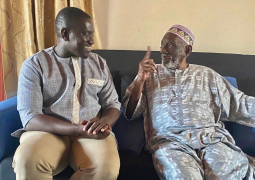
The incident leading to the beating of a male surgical patient at the Ndeban Medical Centre EFSTH is unprofessional, ugly and unethical. The action of the Medical Officer overrides whatever must have led to that reaction.
A patient taken to an emergency department would be in a state of acute ill-health; great pain and in a distressed mood. The treatment expected of its personnel would have been to stabilise, reassure, control the mood of the patient and urgently treat his injury professionally. Such ethics is required of a trained and qualified medical practitioner.
It is, however, not unusual for a doctor or nurse to encounter a ‘difficult’ patient. Indeed, it is not rare for nurses at the Edward Francis Small Teaching Hospital (EFSTH) to encounter uncooperative and ill-mannered patients displaying aggressive behaviour. Nurses spend more time with the patients and therefore suffer the most. The offended medical officer who is of a higher status and who has less contact with patients is expected to be more humane, loving and caring until the desired outcome is achieved. In the worst-case scenario, it would seem much more appropriate for the medical officer to report to the Chief Medical Director (CMD) who would adopt a more plausible and effective approach. In the light of the above, the treatment centre should identify alternative ethical approaches to protect the honour and confidence the community has on this institution.
It is worth mentioning that quite often blatant, systematic inadequacies are encountered at the Ndeban Emergency Department; namely:
- Security guards accepting money to allow vehicles enter and secure a parking space at the premisesis a violation of the institution’s policy. The external frontage of the centre has spaces that could be paved and marked for vehicle parking.
- The exposure of medical specimens to patients for the purpose of conducting laboratory tests in a private facility could be contaminated and the results rendered invalid. Very often specimens are received at these public medical laboratories against payments; the time taken by this poor patient, who is unaware of the time lapse in providing the money, is crucial in the handling of medical specimens.
- The community is being misinformed that treatment is ‘free’ when they are required to pay for consultations, purchase of medications, bandages and plasters in the inpatient/outpatients and private pharmacy. Often unprepared patients engage in unnecessary arguments and aggressive behaviour towards the pharmacists and cashiers.
- The unsightly storage of garbage and refuse in the vicinity and its irregular collection attract stray cats, dogs and scavenger birds. The garbage and refuse storage bins could be located at the rear and access provided for collection vehicles.
- The Ndeban Department of the EFSTH is a critical arm of the hospital and must endeavour to update and modernise its facilities in the areas of sanitation and public health.





